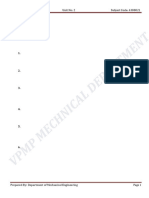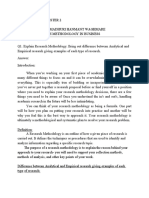0 ratings0% found this document useful (0 votes)
467 viewsNTFS Vs FAT
NTFS Vs FAT
Uploaded by
Raj BharathNTFS and FAT32/16/12 are different file systems with NTFS providing more advanced features than FAT. NTFS allows for larger volume and file sizes (2TB max volume, nearly unlimited max file size) compared to FAT's limits of 32GB for FAT32 and lower for other FAT types. NTFS also includes features such as encryption, compression, permissions and recoverability which FAT lacks. However, FAT performs better than NTFS for small volume sizes due to its simpler design.
Copyright:
Attribution Non-Commercial (BY-NC)
Available Formats
Download as DOC, PDF, TXT or read online from Scribd
NTFS Vs FAT
NTFS Vs FAT
Uploaded by
Raj Bharath0 ratings0% found this document useful (0 votes)
467 views2 pagesNTFS and FAT32/16/12 are different file systems with NTFS providing more advanced features than FAT. NTFS allows for larger volume and file sizes (2TB max volume, nearly unlimited max file size) compared to FAT's limits of 32GB for FAT32 and lower for other FAT types. NTFS also includes features such as encryption, compression, permissions and recoverability which FAT lacks. However, FAT performs better than NTFS for small volume sizes due to its simpler design.
Original Description:
Difference between NTFS and FAT file systems
Original Title
NTFS vs FAT
Copyright
© Attribution Non-Commercial (BY-NC)
Available Formats
DOC, PDF, TXT or read online from Scribd
Share this document
Did you find this document useful?
Is this content inappropriate?
NTFS and FAT32/16/12 are different file systems with NTFS providing more advanced features than FAT. NTFS allows for larger volume and file sizes (2TB max volume, nearly unlimited max file size) compared to FAT's limits of 32GB for FAT32 and lower for other FAT types. NTFS also includes features such as encryption, compression, permissions and recoverability which FAT lacks. However, FAT performs better than NTFS for small volume sizes due to its simpler design.
Copyright:
Attribution Non-Commercial (BY-NC)
Available Formats
Download as DOC, PDF, TXT or read online from Scribd
Download as doc, pdf, or txt
0 ratings0% found this document useful (0 votes)
467 views2 pagesNTFS Vs FAT
NTFS Vs FAT
Uploaded by
Raj BharathNTFS and FAT32/16/12 are different file systems with NTFS providing more advanced features than FAT. NTFS allows for larger volume and file sizes (2TB max volume, nearly unlimited max file size) compared to FAT's limits of 32GB for FAT32 and lower for other FAT types. NTFS also includes features such as encryption, compression, permissions and recoverability which FAT lacks. However, FAT performs better than NTFS for small volume sizes due to its simpler design.
Copyright:
Attribution Non-Commercial (BY-NC)
Available Formats
Download as DOC, PDF, TXT or read online from Scribd
Download as doc, pdf, or txt
You are on page 1of 2
NTFS vs FAT
Criteria NTFS5 NTFS FAT32 FAT16 FAT12
DOS v7
Windows
and higher
Windows NT
Windows
2000 Windows DOS DOS
98
Windows 2000 All versions All versions
Operting Windows
XP Windows of of
System ME
Windows XP Microsoft Microsoft
Windows
2003 Windows Windows Windows
2000
Server 2003
Windows
Server
XP
Limitations
32GB for 2GB for all
Max Volume all OS. OS.
2TB 2TB 16MB
Size 2TB for 4GB for
some OS some OS
Max Files on Nearly Nearly
4194304 65536
Volume Unlimited Unlimited
Limit Only Limit Only 2GB (Limit 16MB
by by 4GB minus Only (Limit Only
Max File Size
Volume Volume 2 Bytes by Volume by Volume
Size Size Size) Size)
Max Clusters Nearly Nearly
4177918 65520 4080
Number Unlimited Unlimited
Standard -
Max File Name 8.3
Up to 255 Up to 255 Up to 255 Up to 254
Length Extended -
up to 255
File System Features
Unicode Unicode System System System
Unicode File
Character Character Character Character Character
Names
Set Set Set Set Set
Second Second Second
System MFT Mirror MFT Mirror
Copy of Copy of Copy of
Records Mirror File File
FAT FAT FAT
Boot Sector First and First and First Sector First Sector First Sector
Location Last Last and
Sectors Sectors Copy in
Sector #6
Standard Standard
Standard Standard Standard
File Attributes and and
Set Set Set
Custom Custom
Alternate
Yes Yes No No No
Streams
Compression Yes Yes No No No
Encryption Yes No No No No
Object
Yes Yes No No No
Permissions
Disk Quotas Yes No No No No
Sparse Files Yes No No No No
Reparse Points Yes No No No No
Volume Mount
Yes No No No No
Points
Overall Performance
Built-In
Yes Yes No No No
Security
Recoverability Yes Yes No No No
Low on Low on High on Highest on
small small small small
Performance volumes volumes volumes volumes High
High on High on Low on Low on
Large Large large large
Minimal on
Disk Space
Max Max Average large Max
Economy
volumes
Fault Tolerance Max Max Minimal Average Average
You might also like
- Dangerous Google - Searching For Secrets PDFDocument12 pagesDangerous Google - Searching For Secrets PDFtamasradu90% (21)
- What I Learned After One Year of Building A Data Platform From Scratch - by Jeremy Surget - MediumDocument15 pagesWhat I Learned After One Year of Building A Data Platform From Scratch - by Jeremy Surget - MediumtataxpNo ratings yet
- Windows 10 VersionsDocument8 pagesWindows 10 VersionsMihaiNo ratings yet
- Comparison Between NTFS and FAT: Ntfs FAT 16/32 NT Compatible With Other Operating Systems (Windows 95, Etc)Document7 pagesComparison Between NTFS and FAT: Ntfs FAT 16/32 NT Compatible With Other Operating Systems (Windows 95, Etc)Naresh Kumar .MNo ratings yet
- NTFS Vs FATDocument1 pageNTFS Vs FATbcdalaiNo ratings yet
- Difference Between File SystemsDocument1 pageDifference Between File SystemsVicken PehlivanianNo ratings yet
- Ntfs Vs FatDocument2 pagesNtfs Vs FatSanjeev SinghNo ratings yet
- MS XP MythsDocument31 pagesMS XP MythsSandip GumtyaNo ratings yet
- Winxp InstallationDocument44 pagesWinxp InstallationDanny Q.No ratings yet
- Ntfs vs. Exfat vs. FatDocument2 pagesNtfs vs. Exfat vs. FatchichavlajaNo ratings yet
- Ntfs & Fat DiffDocument3 pagesNtfs & Fat DiffJoe SylvineNo ratings yet
- Windows Registry, Disk Defragmentor, Manage DisksDocument10 pagesWindows Registry, Disk Defragmentor, Manage DisksManoj PaliwalNo ratings yet
- Product Spec DS218j EnuDocument9 pagesProduct Spec DS218j EnurodrigocarvallocroskNo ratings yet
- Product Spec DS420+ EnuDocument12 pagesProduct Spec DS420+ EnuGiocondo BrenoNo ratings yet
- Hardware and SoftwareDocument5 pagesHardware and SoftwareJullianaNo ratings yet
- Ntfs Vs Fat: NTFS General Info Data Recovery Software F.A.Q. NTFS ForumDocument2 pagesNtfs Vs Fat: NTFS General Info Data Recovery Software F.A.Q. NTFS Forummamabango100% (1)
- Editions of Windows Server 2008Document2 pagesEditions of Windows Server 2008riyasathsafranNo ratings yet
- MacBook Pro 14 (M2 Pro or M2 Max) Vs MacBook Pro 14 (M1 Pro or M1 Max, 2021) - Apple (IN)Document1 pageMacBook Pro 14 (M2 Pro or M2 Max) Vs MacBook Pro 14 (M1 Pro or M1 Max, 2021) - Apple (IN)Juwariyah NafeesNo ratings yet
- Macbook Air 2022 Vs 2022Document1 pageMacbook Air 2022 Vs 2022Rahim shaikhNo ratings yet
- QuizDocument16 pagesQuizmaira buttNo ratings yet
- Guia Estudio Mta Server 1Document11 pagesGuia Estudio Mta Server 1netgame76No ratings yet
- Retail Pro Version 9 Recommended HardwareDocument3 pagesRetail Pro Version 9 Recommended HardwareOmarNo ratings yet
- FS ComparisionDocument3 pagesFS ComparisionsachinkurhekarNo ratings yet
- Product Brief Western Digital WD Blue Mobile Sata HDDDocument2 pagesProduct Brief Western Digital WD Blue Mobile Sata HDDFrendyNo ratings yet
- MAN 0052 Rev JDocument7 pagesMAN 0052 Rev JNey Dalmo Dal ColNo ratings yet
- Windows CE6 Architecture BolingDocument44 pagesWindows CE6 Architecture Bolingyashu589No ratings yet
- PStor Specification V1.4.1Document5 pagesPStor Specification V1.4.1Ricardo MNo ratings yet
- COTIZACIÓN DE EQUIPO DE CÓMPUTO LENOVO-DELL-HP-tmDocument10 pagesCOTIZACIÓN DE EQUIPO DE CÓMPUTO LENOVO-DELL-HP-tmtonymmarroquin4675No ratings yet
- Review Dbms ProjDocument40 pagesReview Dbms Projchintalapati sreeram varmaNo ratings yet
- Computer Networking - Basics: Shajahan AKDocument30 pagesComputer Networking - Basics: Shajahan AKSathya NarayananNo ratings yet
- Latitude 3000 Series (3x60/3x70) : Performance You Can Rely OnDocument3 pagesLatitude 3000 Series (3x60/3x70) : Performance You Can Rely OnoonNo ratings yet
- Chapter 1 CsDocument3 pagesChapter 1 CsRosie-Hsu Eain Si (Rosie)No ratings yet
- DS923+ Product SpecificationDocument13 pagesDS923+ Product SpecificationpowerleakinNo ratings yet
- Study Guide Study Guide: A+ OS TechnologiesDocument64 pagesStudy Guide Study Guide: A+ OS TechnologiesDanno NNo ratings yet
- GeM Comparison SheetDocument7 pagesGeM Comparison SheetRajat DixitNo ratings yet
- DcisdeorxyesDocument1 pageDcisdeorxyesDiegoNo ratings yet
- Introduction To Computers and ProgrammingDocument41 pagesIntroduction To Computers and ProgrammingLEON CAMPUSNo ratings yet
- TS-832PX, TS-832PXU-RP, TS-832PXU Compare Products - QNAPDocument12 pagesTS-832PX, TS-832PXU-RP, TS-832PXU Compare Products - QNAPAkram M. AlmotaaNo ratings yet
- Product Spec SA3410 EnuDocument13 pagesProduct Spec SA3410 EnuEnnoNo ratings yet
- Western Digital WD BlueDocument2 pagesWestern Digital WD BluemorvarideshopNo ratings yet
- Best Buy Laptop Compare 2Document3 pagesBest Buy Laptop Compare 2jay_son19No ratings yet
- terramaster-f2-210-datasheetDocument9 pagesterramaster-f2-210-datasheetCarolus MagnusNo ratings yet
- Empower.3 Control System SpecificationDocument3 pagesEmpower.3 Control System Specificationtajece9733No ratings yet
- TerraMaster F4 210 - ENDocument9 pagesTerraMaster F4 210 - ENhuebertakNo ratings yet
- Product Spec DS1621+ EnuDocument13 pagesProduct Spec DS1621+ EnuithoNo ratings yet
- PACS Server Configuration V2Document1 pagePACS Server Configuration V2ismailNo ratings yet
- Chapter 3 Lab Boot DiskDocument24 pagesChapter 3 Lab Boot DiskAashish RokkaNo ratings yet
- Server Specifications, Specs: What Kind of Servers Are You Using For Shared and Reseller?Document19 pagesServer Specifications, Specs: What Kind of Servers Are You Using For Shared and Reseller?hagos dargoNo ratings yet
- As-7000 Um MultiDocument40 pagesAs-7000 Um MultinuevometropolisNo ratings yet
- Active@ Disk Editor Walkthrough - TSM441Document24 pagesActive@ Disk Editor Walkthrough - TSM441Anonymous CEJyqaKbNo ratings yet
- Atari Harddisk Quick FaqDocument6 pagesAtari Harddisk Quick FaqgreeniousNo ratings yet
- AA Incedo Business Pro Requirement Port Allocation EN v3.2Document7 pagesAA Incedo Business Pro Requirement Port Allocation EN v3.2BurceaNo ratings yet
- ACERlaptopsDocument1 pageACERlaptopsapi-3742719No ratings yet
- Item ComparisonDocument3 pagesItem ComparisonJen LackerNo ratings yet
- Product Spec RS3621xs+Document13 pagesProduct Spec RS3621xs+EnnoNo ratings yet
- 3.3 HDFSDocument32 pages3.3 HDFSantp9254No ratings yet
- MBR VS GPTDocument7 pagesMBR VS GPTkartikjaiswal2011064No ratings yet
- Windows Server Interview QuestionsDocument32 pagesWindows Server Interview Questionsamarendar.puli8207No ratings yet
- 228 Interview QuestionDocument27 pages228 Interview QuestionsaidurgaNo ratings yet
- Workstation Specifications: Specification Sub-SpecDocument12 pagesWorkstation Specifications: Specification Sub-Specmanasvi__sriparnikaNo ratings yet
- 461AALS0C0Document7 pages461AALS0C0AAAA AAAANo ratings yet
- Complete AutoCAD CommandsDocument40 pagesComplete AutoCAD Commandskamoteng100% (1)
- Beep Code ManualDocument8 pagesBeep Code ManualRaj BharathNo ratings yet
- Change Management in Daimler - BenzDocument9 pagesChange Management in Daimler - BenzRaj BharathNo ratings yet
- Dbms NotesDocument56 pagesDbms NotesRajat PatraNo ratings yet
- Nokia Plan EditorDocument13 pagesNokia Plan EditorRupesh PatelNo ratings yet
- Geologi Regional Konawe SelatanDocument1 pageGeologi Regional Konawe SelatanMuhammad Firman PratamaNo ratings yet
- Lab ProgramsDocument22 pagesLab Programsmohammedansil791No ratings yet
- Manuals and Guidelines For Solar Photovoltaic Development in Rural ElectrificationDocument18 pagesManuals and Guidelines For Solar Photovoltaic Development in Rural Electrificationrov1976No ratings yet
- Using Concept Maps in Qualitative ResearchDocument7 pagesUsing Concept Maps in Qualitative ResearchRija HossainNo ratings yet
- VXVM Commands With ExamplesDocument180 pagesVXVM Commands With ExamplesSubash CtNo ratings yet
- Esu Unit 2 EngDocument20 pagesEsu Unit 2 EngKrishna FadaduNo ratings yet
- Synopsis-Rutuja PatilDocument6 pagesSynopsis-Rutuja PatilPariNo ratings yet
- The Digital Library Project VOLUME 1: The World of Knowbots (Draft)Document48 pagesThe Digital Library Project VOLUME 1: The World of Knowbots (Draft)Md Kamruzzaman KhanNo ratings yet
- Research Methodology - Madhuri WaghmareDocument5 pagesResearch Methodology - Madhuri WaghmareMadhuri WaghmareNo ratings yet
- Entrance Test - SQLDocument5 pagesEntrance Test - SQLYudi Muchtar PK SiregarNo ratings yet
- Error Show ReportDocument2 pagesError Show ReportabdiramranNo ratings yet
- 1 Oracle Database Administration: OverviewDocument5 pages1 Oracle Database Administration: Overviewkaushik4endNo ratings yet
- Lesson 3 - 1 Managing Files of RecordsDocument18 pagesLesson 3 - 1 Managing Files of RecordsRussel PonferradaNo ratings yet
- Data Warehousing QuestionnaireDocument5 pagesData Warehousing QuestionnaireBalamurali KoneruNo ratings yet
- WP Qlik Associative Model enDocument12 pagesWP Qlik Associative Model enamitsingh1811No ratings yet
- CC 101 SG1Document16 pagesCC 101 SG1Aaron CarolinoNo ratings yet
- Understanding The Marketing and Management of Trails Using PESTELDocument44 pagesUnderstanding The Marketing and Management of Trails Using PESTELJohurul HoqueNo ratings yet
- 1 Pandas BasicsDocument13 pages1 Pandas BasicsBikuNo ratings yet
- Oracle Recovery ApplianceDocument17 pagesOracle Recovery ApplianceHans-Peter PospisilNo ratings yet
- Mastering Wireshark - Sample ChapterDocument31 pagesMastering Wireshark - Sample ChapterPackt Publishing100% (1)
- Fba Unit 1 2 3Document15 pagesFba Unit 1 2 3Vishal KumarNo ratings yet
- Opnet - Sec - 3Document16 pagesOpnet - Sec - 3Thangavel MuruganNo ratings yet
- Coping Mechanism of A Person With Disability Suffering Stage FrightDocument37 pagesCoping Mechanism of A Person With Disability Suffering Stage FrightGherbe CastañaresNo ratings yet
- Group-1 Question Paper Class Xi Subject: Informatics Practices (065) Time: 3 Hours Max. Marks: 70Document10 pagesGroup-1 Question Paper Class Xi Subject: Informatics Practices (065) Time: 3 Hours Max. Marks: 70rajeshNo ratings yet
- StayAhead Oracle Database 19c Administration Training CourseDocument16 pagesStayAhead Oracle Database 19c Administration Training CourseBugz BinnyNo ratings yet
- Day Wise Topic of Adv - PHPDocument8 pagesDay Wise Topic of Adv - PHPKirti PradhanNo ratings yet
- Windows NT User AdministrationDocument15 pagesWindows NT User AdministrationsmilealwplzNo ratings yet





























































































